C3AHBC1: Review of UK Legislation for Home-Based Child Carers
VerifiedAdded on 2023/01/07
|9
|2647
|64
Report
AI Summary
This report provides a detailed analysis of the legislation and guidelines relevant to home-based child carers in the United Kingdom. It begins with an introduction emphasizing the importance of child care and the role of legislation in ensuring children's welfare. The report delves into specific acts, including the Children Act 1989, United Nations Convention on the Rights of the Child, Education Act 1996, Care Standards Act 2000, Human Rights Act 1998, Special Educational Needs and Disability Act 2001, Children Act 2004, Childcare Act 2006, and Children and Young People Act 2008. Each act is summarized, highlighting its key provisions and impact on child care practices. Furthermore, the report includes a summary of the current legislation and guidelines through a spider diagram, covering areas such as the health and safety of children, safeguarding, and equality, diversity, and inclusion. The conclusion reiterates the significance of adhering to these legislations for the optimal development and growth of children. The report emphasizes the importance of following each legislation in an effective manner.
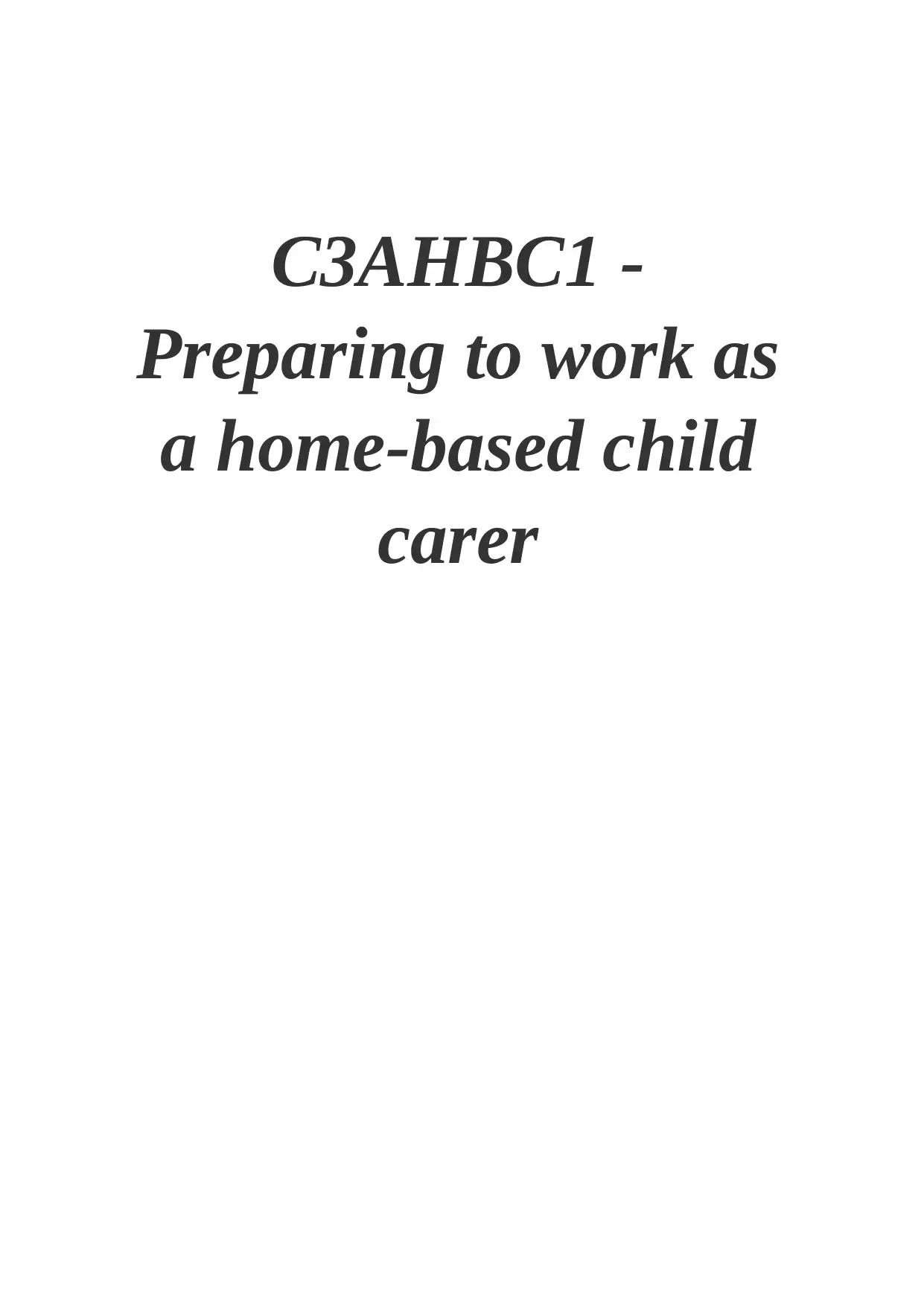
C3AHBC1 -
Preparing to work as
a home-based child
carer
Preparing to work as
a home-based child
carer
Paraphrase This Document
Need a fresh take? Get an instant paraphrase of this document with our AI Paraphraser

INTRODUCTION...............................................................................................................................2
TASK 1.................................................................................................................................................2
Legislation related to the work of home-based child carer................................................................2
TASK 2.................................................................................................................................................6
Complete a spider diagram or mind map to summarise current legislation and guidelines................6
CONCLUSION....................................................................................................................................7
REFERENCES....................................................................................................................................8
TASK 1.................................................................................................................................................2
Legislation related to the work of home-based child carer................................................................2
TASK 2.................................................................................................................................................6
Complete a spider diagram or mind map to summarise current legislation and guidelines................6
CONCLUSION....................................................................................................................................7
REFERENCES....................................................................................................................................8
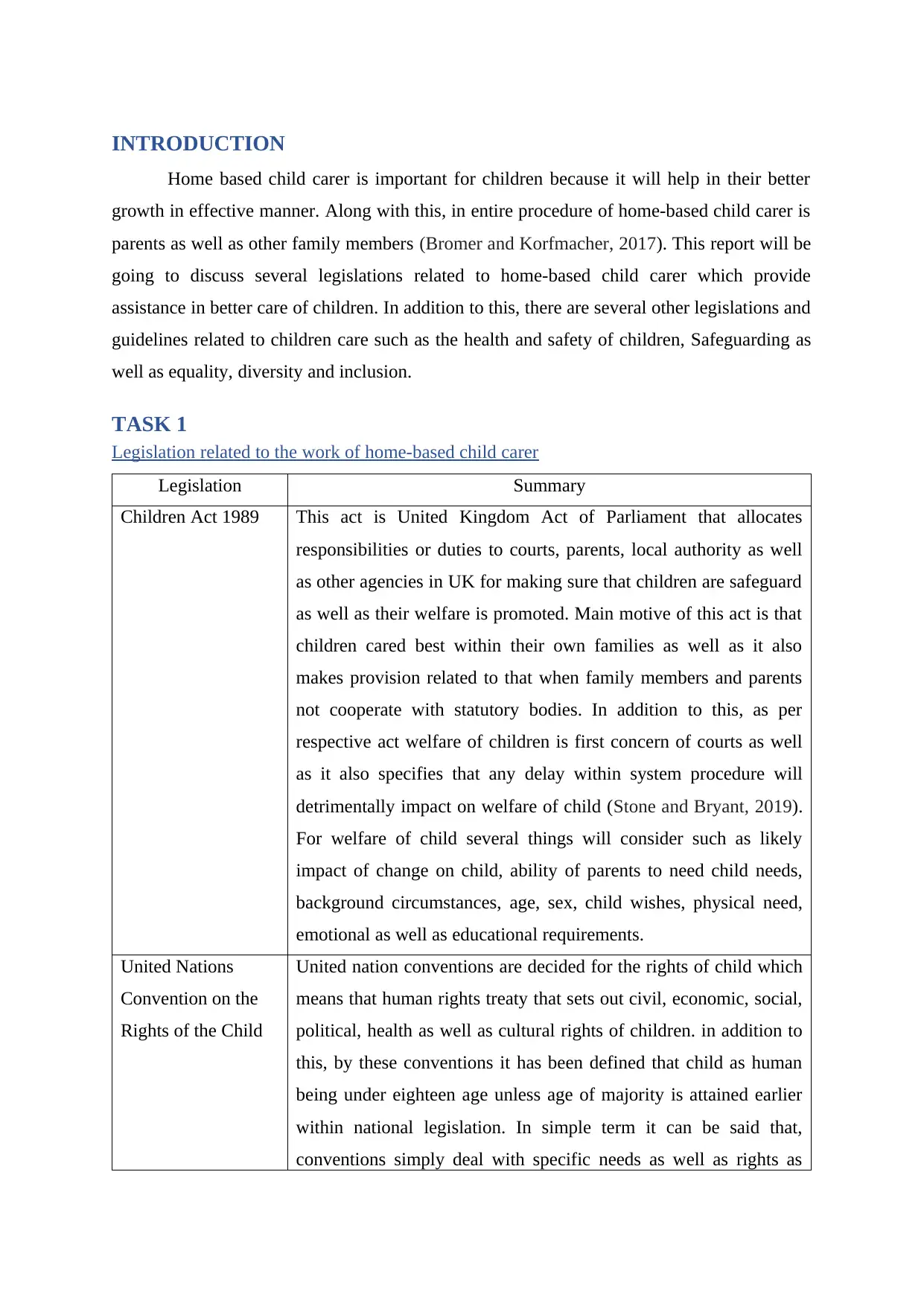
INTRODUCTION
Home based child carer is important for children because it will help in their better
growth in effective manner. Along with this, in entire procedure of home-based child carer is
parents as well as other family members (Bromer and Korfmacher, 2017). This report will be
going to discuss several legislations related to home-based child carer which provide
assistance in better care of children. In addition to this, there are several other legislations and
guidelines related to children care such as the health and safety of children, Safeguarding as
well as equality, diversity and inclusion.
TASK 1
Legislation related to the work of home-based child carer
Legislation Summary
Children Act 1989 This act is United Kingdom Act of Parliament that allocates
responsibilities or duties to courts, parents, local authority as well
as other agencies in UK for making sure that children are safeguard
as well as their welfare is promoted. Main motive of this act is that
children cared best within their own families as well as it also
makes provision related to that when family members and parents
not cooperate with statutory bodies. In addition to this, as per
respective act welfare of children is first concern of courts as well
as it also specifies that any delay within system procedure will
detrimentally impact on welfare of child (Stone and Bryant, 2019).
For welfare of child several things will consider such as likely
impact of change on child, ability of parents to need child needs,
background circumstances, age, sex, child wishes, physical need,
emotional as well as educational requirements.
United Nations
Convention on the
Rights of the Child
United nation conventions are decided for the rights of child which
means that human rights treaty that sets out civil, economic, social,
political, health as well as cultural rights of children. in addition to
this, by these conventions it has been defined that child as human
being under eighteen age unless age of majority is attained earlier
within national legislation. In simple term it can be said that,
conventions simply deal with specific needs as well as rights as
Home based child carer is important for children because it will help in their better
growth in effective manner. Along with this, in entire procedure of home-based child carer is
parents as well as other family members (Bromer and Korfmacher, 2017). This report will be
going to discuss several legislations related to home-based child carer which provide
assistance in better care of children. In addition to this, there are several other legislations and
guidelines related to children care such as the health and safety of children, Safeguarding as
well as equality, diversity and inclusion.
TASK 1
Legislation related to the work of home-based child carer
Legislation Summary
Children Act 1989 This act is United Kingdom Act of Parliament that allocates
responsibilities or duties to courts, parents, local authority as well
as other agencies in UK for making sure that children are safeguard
as well as their welfare is promoted. Main motive of this act is that
children cared best within their own families as well as it also
makes provision related to that when family members and parents
not cooperate with statutory bodies. In addition to this, as per
respective act welfare of children is first concern of courts as well
as it also specifies that any delay within system procedure will
detrimentally impact on welfare of child (Stone and Bryant, 2019).
For welfare of child several things will consider such as likely
impact of change on child, ability of parents to need child needs,
background circumstances, age, sex, child wishes, physical need,
emotional as well as educational requirements.
United Nations
Convention on the
Rights of the Child
United nation conventions are decided for the rights of child which
means that human rights treaty that sets out civil, economic, social,
political, health as well as cultural rights of children. in addition to
this, by these conventions it has been defined that child as human
being under eighteen age unless age of majority is attained earlier
within national legislation. In simple term it can be said that,
conventions simply deal with specific needs as well as rights as
⊘ This is a preview!⊘
Do you want full access?
Subscribe today to unlock all pages.

Trusted by 1+ million students worldwide
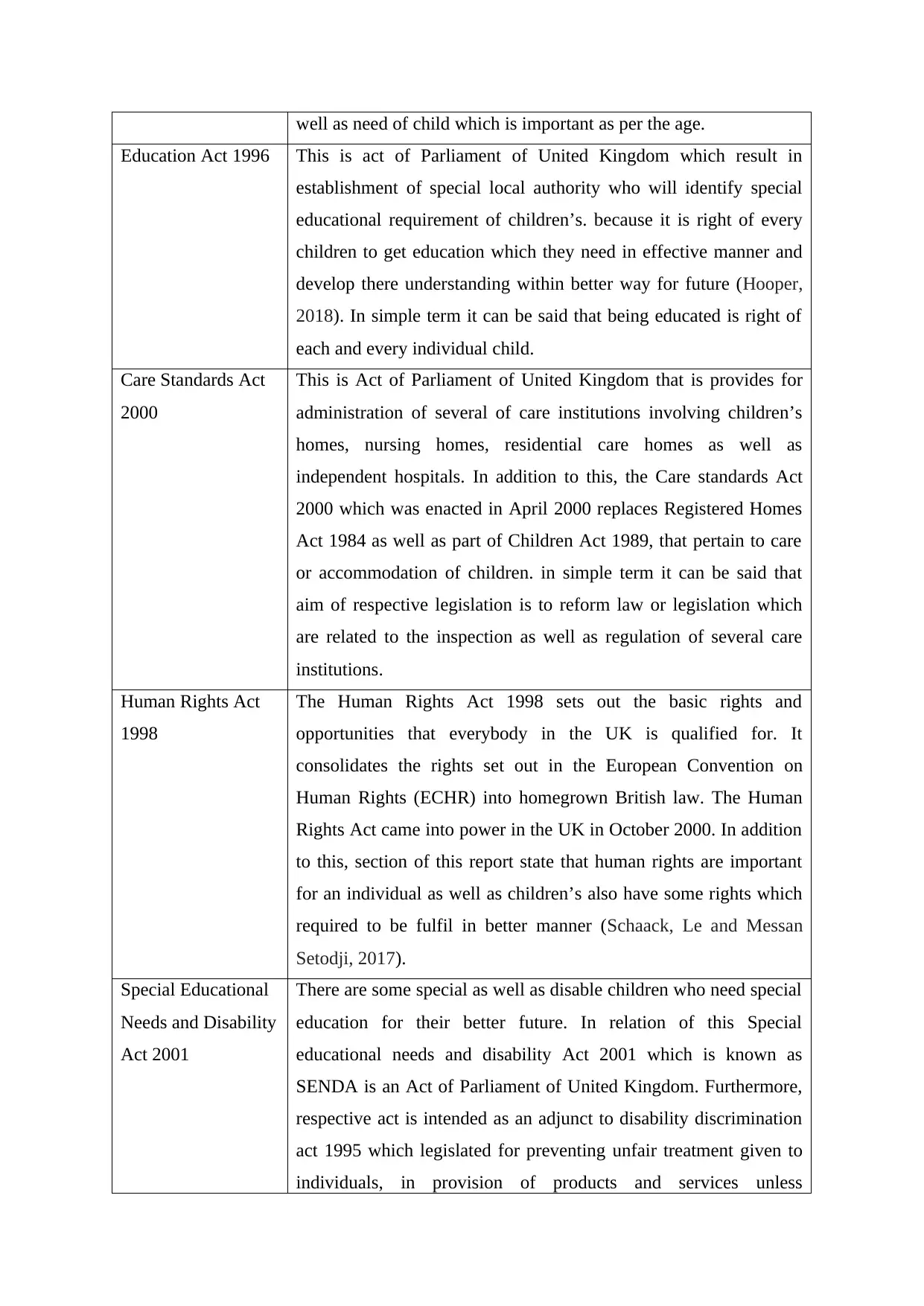
well as need of child which is important as per the age.
Education Act 1996 This is act of Parliament of United Kingdom which result in
establishment of special local authority who will identify special
educational requirement of children’s. because it is right of every
children to get education which they need in effective manner and
develop there understanding within better way for future (Hooper,
2018). In simple term it can be said that being educated is right of
each and every individual child.
Care Standards Act
2000
This is Act of Parliament of United Kingdom that is provides for
administration of several of care institutions involving children’s
homes, nursing homes, residential care homes as well as
independent hospitals. In addition to this, the Care standards Act
2000 which was enacted in April 2000 replaces Registered Homes
Act 1984 as well as part of Children Act 1989, that pertain to care
or accommodation of children. in simple term it can be said that
aim of respective legislation is to reform law or legislation which
are related to the inspection as well as regulation of several care
institutions.
Human Rights Act
1998
The Human Rights Act 1998 sets out the basic rights and
opportunities that everybody in the UK is qualified for. It
consolidates the rights set out in the European Convention on
Human Rights (ECHR) into homegrown British law. The Human
Rights Act came into power in the UK in October 2000. In addition
to this, section of this report state that human rights are important
for an individual as well as children’s also have some rights which
required to be fulfil in better manner (Schaack, Le and Messan
Setodji, 2017).
Special Educational
Needs and Disability
Act 2001
There are some special as well as disable children who need special
education for their better future. In relation of this Special
educational needs and disability Act 2001 which is known as
SENDA is an Act of Parliament of United Kingdom. Furthermore,
respective act is intended as an adjunct to disability discrimination
act 1995 which legislated for preventing unfair treatment given to
individuals, in provision of products and services unless
Education Act 1996 This is act of Parliament of United Kingdom which result in
establishment of special local authority who will identify special
educational requirement of children’s. because it is right of every
children to get education which they need in effective manner and
develop there understanding within better way for future (Hooper,
2018). In simple term it can be said that being educated is right of
each and every individual child.
Care Standards Act
2000
This is Act of Parliament of United Kingdom that is provides for
administration of several of care institutions involving children’s
homes, nursing homes, residential care homes as well as
independent hospitals. In addition to this, the Care standards Act
2000 which was enacted in April 2000 replaces Registered Homes
Act 1984 as well as part of Children Act 1989, that pertain to care
or accommodation of children. in simple term it can be said that
aim of respective legislation is to reform law or legislation which
are related to the inspection as well as regulation of several care
institutions.
Human Rights Act
1998
The Human Rights Act 1998 sets out the basic rights and
opportunities that everybody in the UK is qualified for. It
consolidates the rights set out in the European Convention on
Human Rights (ECHR) into homegrown British law. The Human
Rights Act came into power in the UK in October 2000. In addition
to this, section of this report state that human rights are important
for an individual as well as children’s also have some rights which
required to be fulfil in better manner (Schaack, Le and Messan
Setodji, 2017).
Special Educational
Needs and Disability
Act 2001
There are some special as well as disable children who need special
education for their better future. In relation of this Special
educational needs and disability Act 2001 which is known as
SENDA is an Act of Parliament of United Kingdom. Furthermore,
respective act is intended as an adjunct to disability discrimination
act 1995 which legislated for preventing unfair treatment given to
individuals, in provision of products and services unless
Paraphrase This Document
Need a fresh take? Get an instant paraphrase of this document with our AI Paraphraser
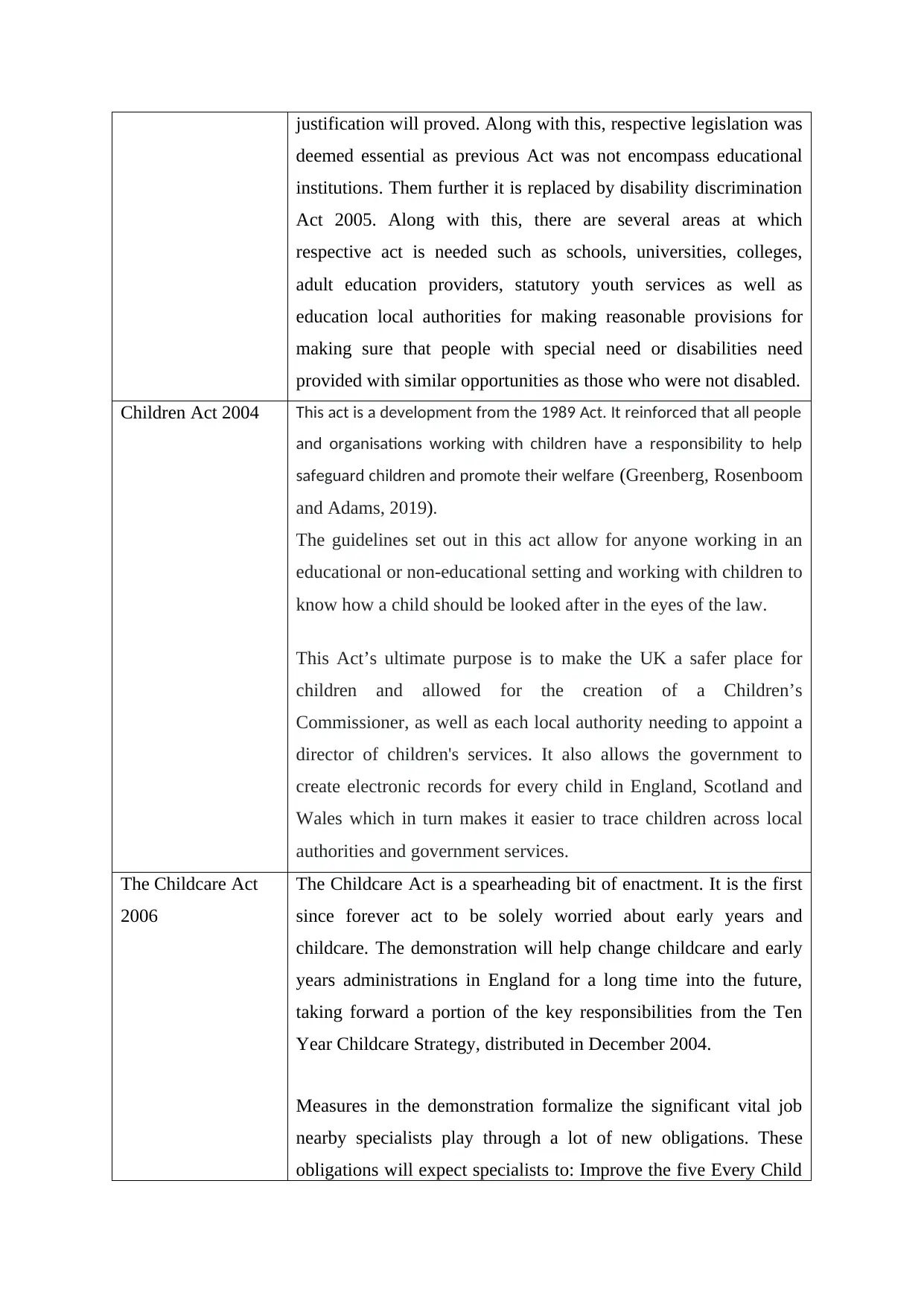
justification will proved. Along with this, respective legislation was
deemed essential as previous Act was not encompass educational
institutions. Them further it is replaced by disability discrimination
Act 2005. Along with this, there are several areas at which
respective act is needed such as schools, universities, colleges,
adult education providers, statutory youth services as well as
education local authorities for making reasonable provisions for
making sure that people with special need or disabilities need
provided with similar opportunities as those who were not disabled.
Children Act 2004 This act is a development from the 1989 Act. It reinforced that all people
and organisations working with children have a responsibility to help
safeguard children and promote their welfare (Greenberg, Rosenboom
and Adams, 2019).
The guidelines set out in this act allow for anyone working in an
educational or non-educational setting and working with children to
know how a child should be looked after in the eyes of the law.
This Act’s ultimate purpose is to make the UK a safer place for
children and allowed for the creation of a Children’s
Commissioner, as well as each local authority needing to appoint a
director of children's services. It also allows the government to
create electronic records for every child in England, Scotland and
Wales which in turn makes it easier to trace children across local
authorities and government services.
The Childcare Act
2006
The Childcare Act is a spearheading bit of enactment. It is the first
since forever act to be solely worried about early years and
childcare. The demonstration will help change childcare and early
years administrations in England for a long time into the future,
taking forward a portion of the key responsibilities from the Ten
Year Childcare Strategy, distributed in December 2004.
Measures in the demonstration formalize the significant vital job
nearby specialists play through a lot of new obligations. These
obligations will expect specialists to: Improve the five Every Child
deemed essential as previous Act was not encompass educational
institutions. Them further it is replaced by disability discrimination
Act 2005. Along with this, there are several areas at which
respective act is needed such as schools, universities, colleges,
adult education providers, statutory youth services as well as
education local authorities for making reasonable provisions for
making sure that people with special need or disabilities need
provided with similar opportunities as those who were not disabled.
Children Act 2004 This act is a development from the 1989 Act. It reinforced that all people
and organisations working with children have a responsibility to help
safeguard children and promote their welfare (Greenberg, Rosenboom
and Adams, 2019).
The guidelines set out in this act allow for anyone working in an
educational or non-educational setting and working with children to
know how a child should be looked after in the eyes of the law.
This Act’s ultimate purpose is to make the UK a safer place for
children and allowed for the creation of a Children’s
Commissioner, as well as each local authority needing to appoint a
director of children's services. It also allows the government to
create electronic records for every child in England, Scotland and
Wales which in turn makes it easier to trace children across local
authorities and government services.
The Childcare Act
2006
The Childcare Act is a spearheading bit of enactment. It is the first
since forever act to be solely worried about early years and
childcare. The demonstration will help change childcare and early
years administrations in England for a long time into the future,
taking forward a portion of the key responsibilities from the Ten
Year Childcare Strategy, distributed in December 2004.
Measures in the demonstration formalize the significant vital job
nearby specialists play through a lot of new obligations. These
obligations will expect specialists to: Improve the five Every Child
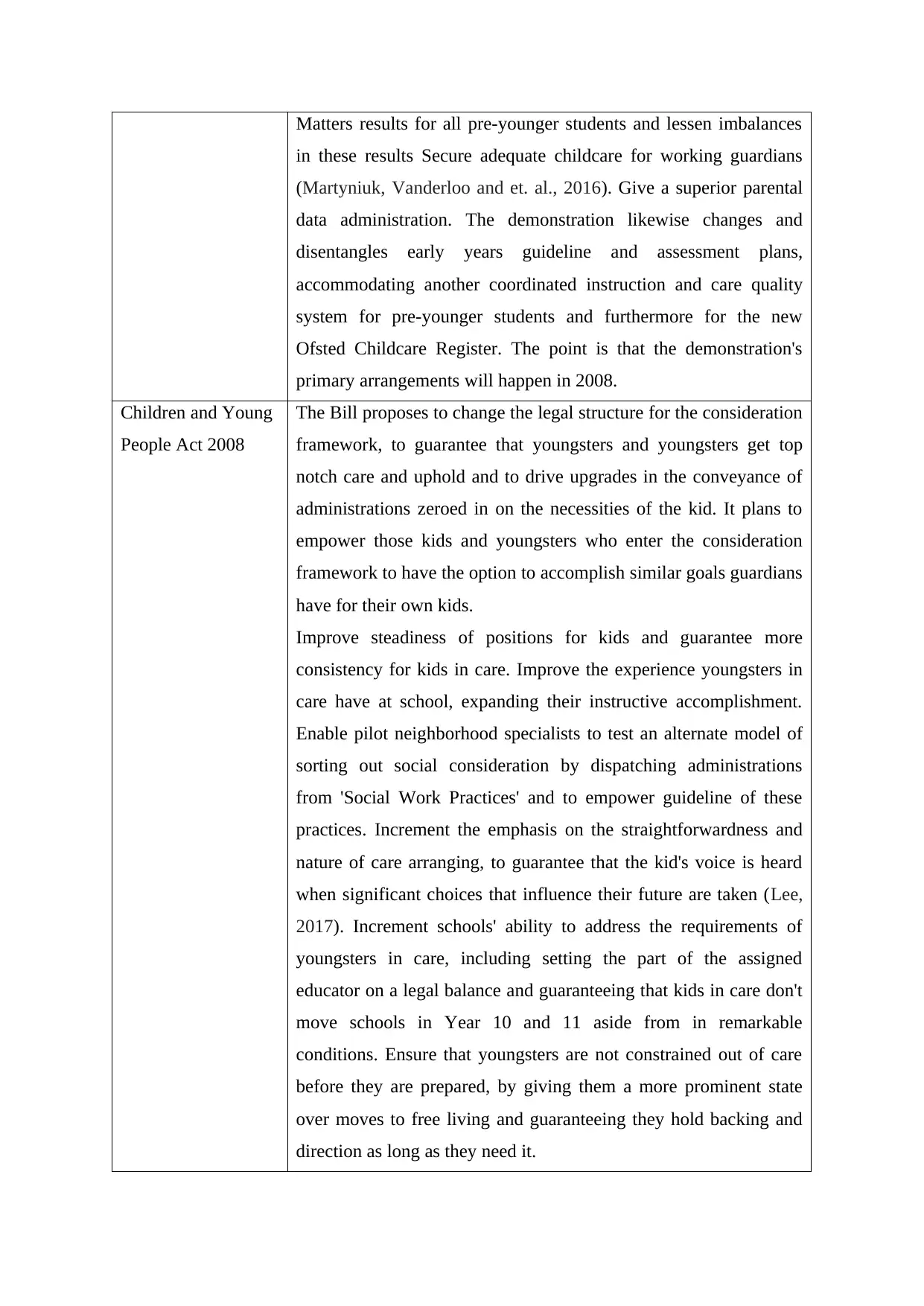
Matters results for all pre-younger students and lessen imbalances
in these results Secure adequate childcare for working guardians
(Martyniuk, Vanderloo and et. al., 2016). Give a superior parental
data administration. The demonstration likewise changes and
disentangles early years guideline and assessment plans,
accommodating another coordinated instruction and care quality
system for pre-younger students and furthermore for the new
Ofsted Childcare Register. The point is that the demonstration's
primary arrangements will happen in 2008.
Children and Young
People Act 2008
The Bill proposes to change the legal structure for the consideration
framework, to guarantee that youngsters and youngsters get top
notch care and uphold and to drive upgrades in the conveyance of
administrations zeroed in on the necessities of the kid. It plans to
empower those kids and youngsters who enter the consideration
framework to have the option to accomplish similar goals guardians
have for their own kids.
Improve steadiness of positions for kids and guarantee more
consistency for kids in care. Improve the experience youngsters in
care have at school, expanding their instructive accomplishment.
Enable pilot neighborhood specialists to test an alternate model of
sorting out social consideration by dispatching administrations
from 'Social Work Practices' and to empower guideline of these
practices. Increment the emphasis on the straightforwardness and
nature of care arranging, to guarantee that the kid's voice is heard
when significant choices that influence their future are taken (Lee,
2017). Increment schools' ability to address the requirements of
youngsters in care, including setting the part of the assigned
educator on a legal balance and guaranteeing that kids in care don't
move schools in Year 10 and 11 aside from in remarkable
conditions. Ensure that youngsters are not constrained out of care
before they are prepared, by giving them a more prominent state
over moves to free living and guaranteeing they hold backing and
direction as long as they need it.
in these results Secure adequate childcare for working guardians
(Martyniuk, Vanderloo and et. al., 2016). Give a superior parental
data administration. The demonstration likewise changes and
disentangles early years guideline and assessment plans,
accommodating another coordinated instruction and care quality
system for pre-younger students and furthermore for the new
Ofsted Childcare Register. The point is that the demonstration's
primary arrangements will happen in 2008.
Children and Young
People Act 2008
The Bill proposes to change the legal structure for the consideration
framework, to guarantee that youngsters and youngsters get top
notch care and uphold and to drive upgrades in the conveyance of
administrations zeroed in on the necessities of the kid. It plans to
empower those kids and youngsters who enter the consideration
framework to have the option to accomplish similar goals guardians
have for their own kids.
Improve steadiness of positions for kids and guarantee more
consistency for kids in care. Improve the experience youngsters in
care have at school, expanding their instructive accomplishment.
Enable pilot neighborhood specialists to test an alternate model of
sorting out social consideration by dispatching administrations
from 'Social Work Practices' and to empower guideline of these
practices. Increment the emphasis on the straightforwardness and
nature of care arranging, to guarantee that the kid's voice is heard
when significant choices that influence their future are taken (Lee,
2017). Increment schools' ability to address the requirements of
youngsters in care, including setting the part of the assigned
educator on a legal balance and guaranteeing that kids in care don't
move schools in Year 10 and 11 aside from in remarkable
conditions. Ensure that youngsters are not constrained out of care
before they are prepared, by giving them a more prominent state
over moves to free living and guaranteeing they hold backing and
direction as long as they need it.
⊘ This is a preview!⊘
Do you want full access?
Subscribe today to unlock all pages.

Trusted by 1+ million students worldwide
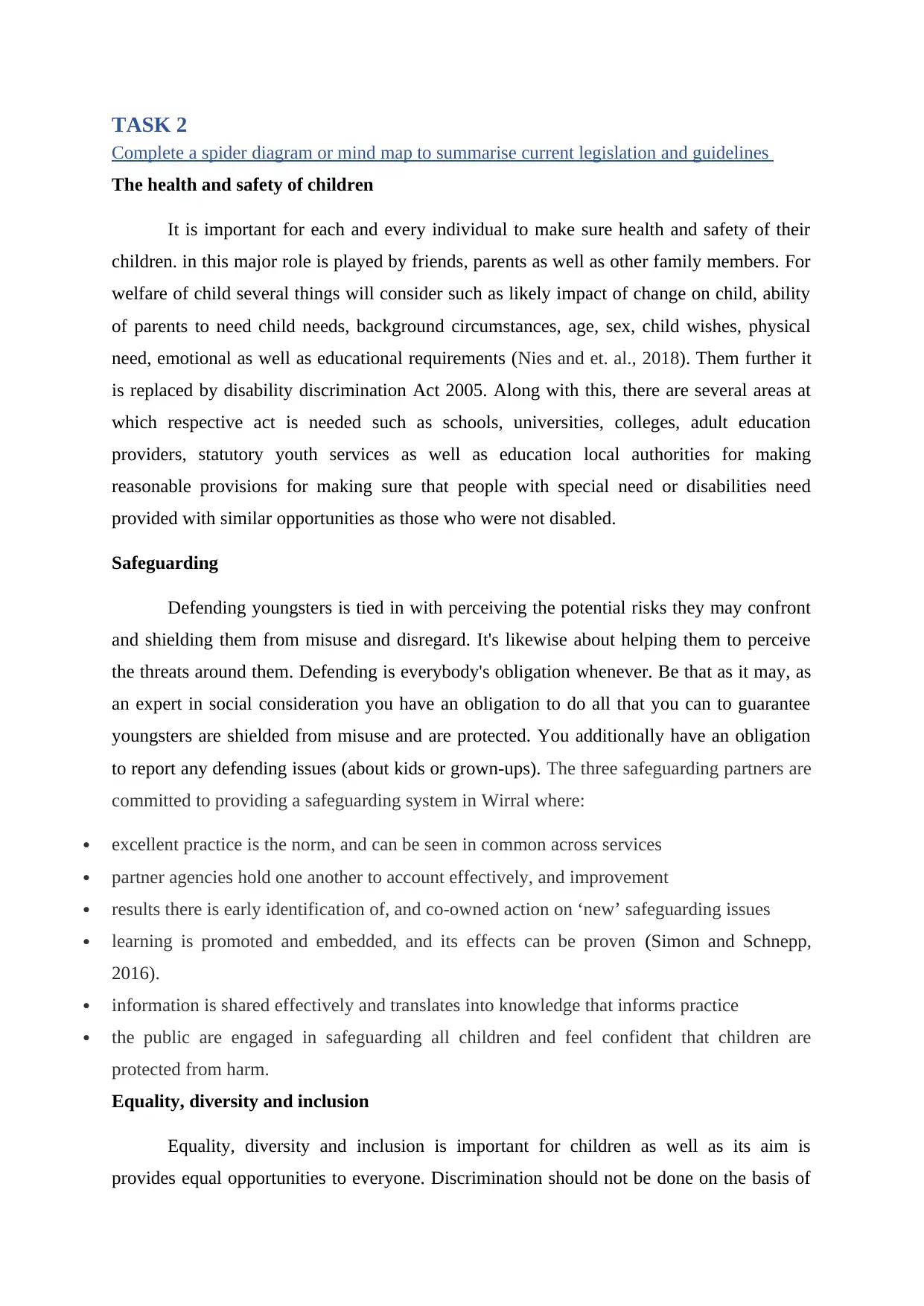
TASK 2
Complete a spider diagram or mind map to summarise current legislation and guidelines
The health and safety of children
It is important for each and every individual to make sure health and safety of their
children. in this major role is played by friends, parents as well as other family members. For
welfare of child several things will consider such as likely impact of change on child, ability
of parents to need child needs, background circumstances, age, sex, child wishes, physical
need, emotional as well as educational requirements (Nies and et. al., 2018). Them further it
is replaced by disability discrimination Act 2005. Along with this, there are several areas at
which respective act is needed such as schools, universities, colleges, adult education
providers, statutory youth services as well as education local authorities for making
reasonable provisions for making sure that people with special need or disabilities need
provided with similar opportunities as those who were not disabled.
Safeguarding
Defending youngsters is tied in with perceiving the potential risks they may confront
and shielding them from misuse and disregard. It's likewise about helping them to perceive
the threats around them. Defending is everybody's obligation whenever. Be that as it may, as
an expert in social consideration you have an obligation to do all that you can to guarantee
youngsters are shielded from misuse and are protected. You additionally have an obligation
to report any defending issues (about kids or grown-ups). The three safeguarding partners are
committed to providing a safeguarding system in Wirral where:
excellent practice is the norm, and can be seen in common across services
partner agencies hold one another to account effectively, and improvement
results there is early identification of, and co-owned action on ‘new’ safeguarding issues
learning is promoted and embedded, and its effects can be proven (Simon and Schnepp,
2016).
information is shared effectively and translates into knowledge that informs practice
the public are engaged in safeguarding all children and feel confident that children are
protected from harm.
Equality, diversity and inclusion
Equality, diversity and inclusion is important for children as well as its aim is
provides equal opportunities to everyone. Discrimination should not be done on the basis of
Complete a spider diagram or mind map to summarise current legislation and guidelines
The health and safety of children
It is important for each and every individual to make sure health and safety of their
children. in this major role is played by friends, parents as well as other family members. For
welfare of child several things will consider such as likely impact of change on child, ability
of parents to need child needs, background circumstances, age, sex, child wishes, physical
need, emotional as well as educational requirements (Nies and et. al., 2018). Them further it
is replaced by disability discrimination Act 2005. Along with this, there are several areas at
which respective act is needed such as schools, universities, colleges, adult education
providers, statutory youth services as well as education local authorities for making
reasonable provisions for making sure that people with special need or disabilities need
provided with similar opportunities as those who were not disabled.
Safeguarding
Defending youngsters is tied in with perceiving the potential risks they may confront
and shielding them from misuse and disregard. It's likewise about helping them to perceive
the threats around them. Defending is everybody's obligation whenever. Be that as it may, as
an expert in social consideration you have an obligation to do all that you can to guarantee
youngsters are shielded from misuse and are protected. You additionally have an obligation
to report any defending issues (about kids or grown-ups). The three safeguarding partners are
committed to providing a safeguarding system in Wirral where:
excellent practice is the norm, and can be seen in common across services
partner agencies hold one another to account effectively, and improvement
results there is early identification of, and co-owned action on ‘new’ safeguarding issues
learning is promoted and embedded, and its effects can be proven (Simon and Schnepp,
2016).
information is shared effectively and translates into knowledge that informs practice
the public are engaged in safeguarding all children and feel confident that children are
protected from harm.
Equality, diversity and inclusion
Equality, diversity and inclusion is important for children as well as its aim is
provides equal opportunities to everyone. Discrimination should not be done on the basis of
Paraphrase This Document
Need a fresh take? Get an instant paraphrase of this document with our AI Paraphraser
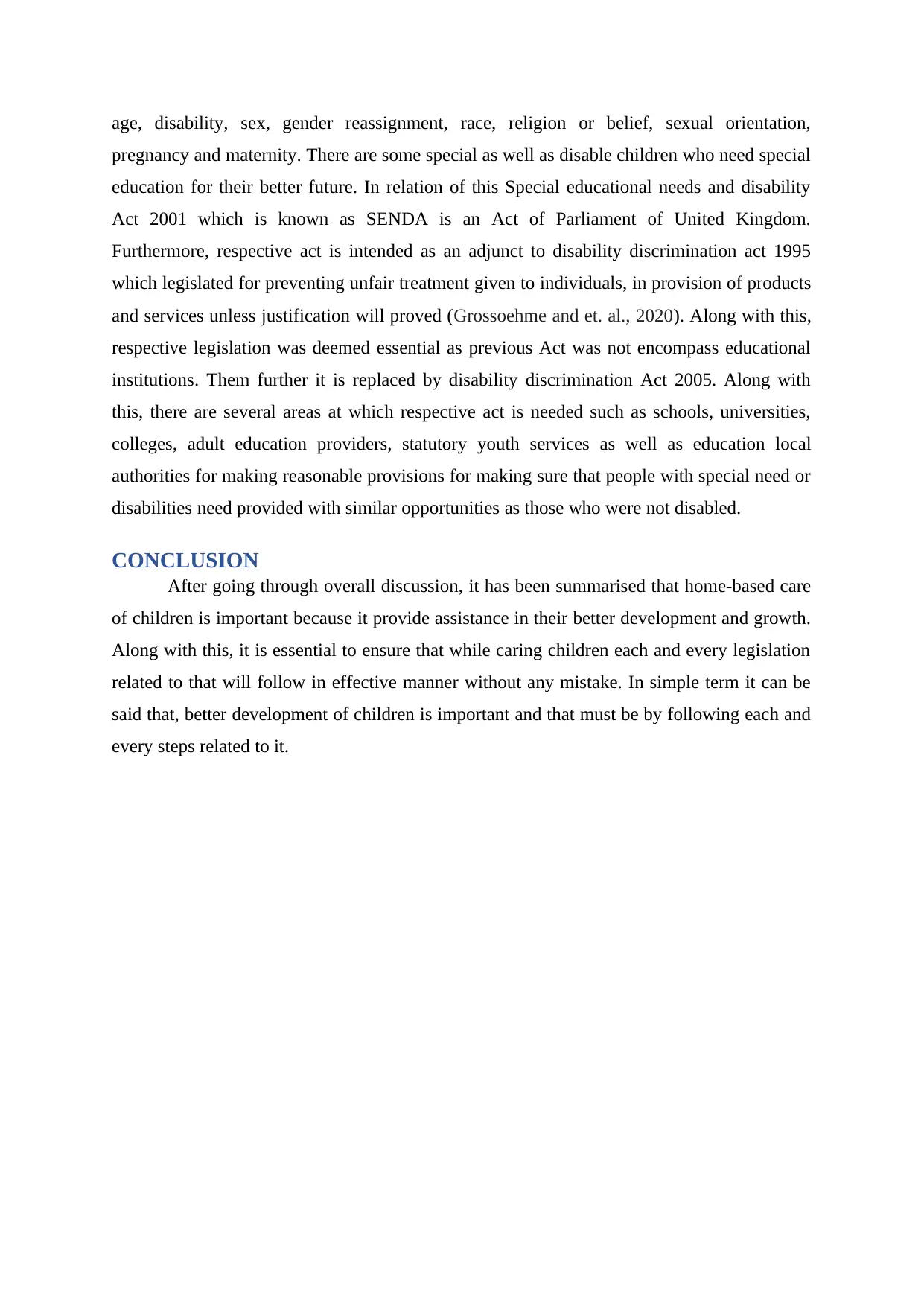
age, disability, sex, gender reassignment, race, religion or belief, sexual orientation,
pregnancy and maternity. There are some special as well as disable children who need special
education for their better future. In relation of this Special educational needs and disability
Act 2001 which is known as SENDA is an Act of Parliament of United Kingdom.
Furthermore, respective act is intended as an adjunct to disability discrimination act 1995
which legislated for preventing unfair treatment given to individuals, in provision of products
and services unless justification will proved (Grossoehme and et. al., 2020). Along with this,
respective legislation was deemed essential as previous Act was not encompass educational
institutions. Them further it is replaced by disability discrimination Act 2005. Along with
this, there are several areas at which respective act is needed such as schools, universities,
colleges, adult education providers, statutory youth services as well as education local
authorities for making reasonable provisions for making sure that people with special need or
disabilities need provided with similar opportunities as those who were not disabled.
CONCLUSION
After going through overall discussion, it has been summarised that home-based care
of children is important because it provide assistance in their better development and growth.
Along with this, it is essential to ensure that while caring children each and every legislation
related to that will follow in effective manner without any mistake. In simple term it can be
said that, better development of children is important and that must be by following each and
every steps related to it.
pregnancy and maternity. There are some special as well as disable children who need special
education for their better future. In relation of this Special educational needs and disability
Act 2001 which is known as SENDA is an Act of Parliament of United Kingdom.
Furthermore, respective act is intended as an adjunct to disability discrimination act 1995
which legislated for preventing unfair treatment given to individuals, in provision of products
and services unless justification will proved (Grossoehme and et. al., 2020). Along with this,
respective legislation was deemed essential as previous Act was not encompass educational
institutions. Them further it is replaced by disability discrimination Act 2005. Along with
this, there are several areas at which respective act is needed such as schools, universities,
colleges, adult education providers, statutory youth services as well as education local
authorities for making reasonable provisions for making sure that people with special need or
disabilities need provided with similar opportunities as those who were not disabled.
CONCLUSION
After going through overall discussion, it has been summarised that home-based care
of children is important because it provide assistance in their better development and growth.
Along with this, it is essential to ensure that while caring children each and every legislation
related to that will follow in effective manner without any mistake. In simple term it can be
said that, better development of children is important and that must be by following each and
every steps related to it.
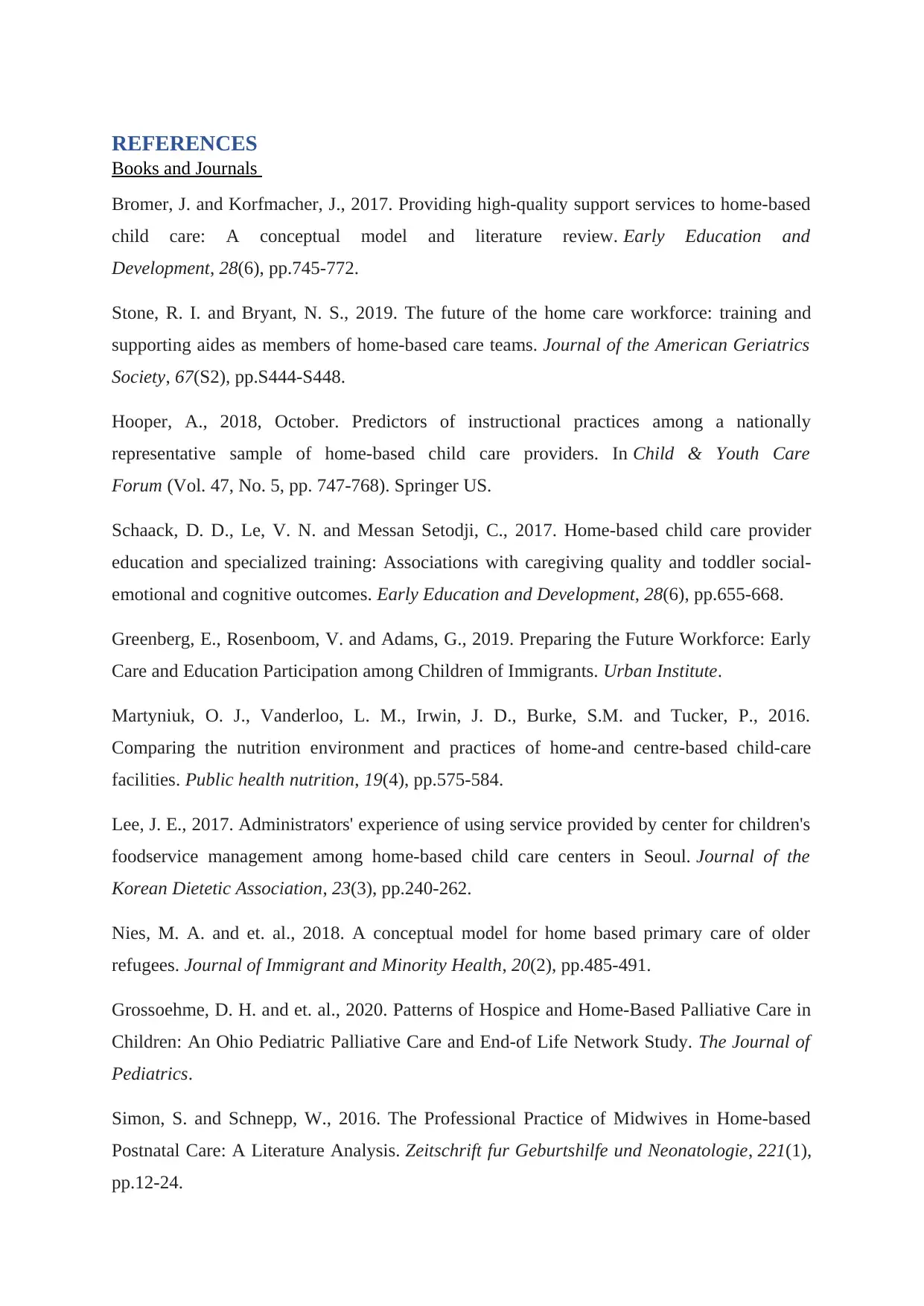
REFERENCES
Books and Journals
Bromer, J. and Korfmacher, J., 2017. Providing high-quality support services to home-based
child care: A conceptual model and literature review. Early Education and
Development, 28(6), pp.745-772.
Stone, R. I. and Bryant, N. S., 2019. The future of the home care workforce: training and
supporting aides as members of home‐based care teams. Journal of the American Geriatrics
Society, 67(S2), pp.S444-S448.
Hooper, A., 2018, October. Predictors of instructional practices among a nationally
representative sample of home-based child care providers. In Child & Youth Care
Forum (Vol. 47, No. 5, pp. 747-768). Springer US.
Schaack, D. D., Le, V. N. and Messan Setodji, C., 2017. Home-based child care provider
education and specialized training: Associations with caregiving quality and toddler social-
emotional and cognitive outcomes. Early Education and Development, 28(6), pp.655-668.
Greenberg, E., Rosenboom, V. and Adams, G., 2019. Preparing the Future Workforce: Early
Care and Education Participation among Children of Immigrants. Urban Institute.
Martyniuk, O. J., Vanderloo, L. M., Irwin, J. D., Burke, S.M. and Tucker, P., 2016.
Comparing the nutrition environment and practices of home-and centre-based child-care
facilities. Public health nutrition, 19(4), pp.575-584.
Lee, J. E., 2017. Administrators' experience of using service provided by center for children's
foodservice management among home-based child care centers in Seoul. Journal of the
Korean Dietetic Association, 23(3), pp.240-262.
Nies, M. A. and et. al., 2018. A conceptual model for home based primary care of older
refugees. Journal of Immigrant and Minority Health, 20(2), pp.485-491.
Grossoehme, D. H. and et. al., 2020. Patterns of Hospice and Home-Based Palliative Care in
Children: An Ohio Pediatric Palliative Care and End-of Life Network Study. The Journal of
Pediatrics.
Simon, S. and Schnepp, W., 2016. The Professional Practice of Midwives in Home-based
Postnatal Care: A Literature Analysis. Zeitschrift fur Geburtshilfe und Neonatologie, 221(1),
pp.12-24.
Books and Journals
Bromer, J. and Korfmacher, J., 2017. Providing high-quality support services to home-based
child care: A conceptual model and literature review. Early Education and
Development, 28(6), pp.745-772.
Stone, R. I. and Bryant, N. S., 2019. The future of the home care workforce: training and
supporting aides as members of home‐based care teams. Journal of the American Geriatrics
Society, 67(S2), pp.S444-S448.
Hooper, A., 2018, October. Predictors of instructional practices among a nationally
representative sample of home-based child care providers. In Child & Youth Care
Forum (Vol. 47, No. 5, pp. 747-768). Springer US.
Schaack, D. D., Le, V. N. and Messan Setodji, C., 2017. Home-based child care provider
education and specialized training: Associations with caregiving quality and toddler social-
emotional and cognitive outcomes. Early Education and Development, 28(6), pp.655-668.
Greenberg, E., Rosenboom, V. and Adams, G., 2019. Preparing the Future Workforce: Early
Care and Education Participation among Children of Immigrants. Urban Institute.
Martyniuk, O. J., Vanderloo, L. M., Irwin, J. D., Burke, S.M. and Tucker, P., 2016.
Comparing the nutrition environment and practices of home-and centre-based child-care
facilities. Public health nutrition, 19(4), pp.575-584.
Lee, J. E., 2017. Administrators' experience of using service provided by center for children's
foodservice management among home-based child care centers in Seoul. Journal of the
Korean Dietetic Association, 23(3), pp.240-262.
Nies, M. A. and et. al., 2018. A conceptual model for home based primary care of older
refugees. Journal of Immigrant and Minority Health, 20(2), pp.485-491.
Grossoehme, D. H. and et. al., 2020. Patterns of Hospice and Home-Based Palliative Care in
Children: An Ohio Pediatric Palliative Care and End-of Life Network Study. The Journal of
Pediatrics.
Simon, S. and Schnepp, W., 2016. The Professional Practice of Midwives in Home-based
Postnatal Care: A Literature Analysis. Zeitschrift fur Geburtshilfe und Neonatologie, 221(1),
pp.12-24.
⊘ This is a preview!⊘
Do you want full access?
Subscribe today to unlock all pages.

Trusted by 1+ million students worldwide
1 out of 9
Related Documents
Your All-in-One AI-Powered Toolkit for Academic Success.
+13062052269
info@desklib.com
Available 24*7 on WhatsApp / Email
![[object Object]](/_next/static/media/star-bottom.7253800d.svg)
Unlock your academic potential
Copyright © 2020–2026 A2Z Services. All Rights Reserved. Developed and managed by ZUCOL.





